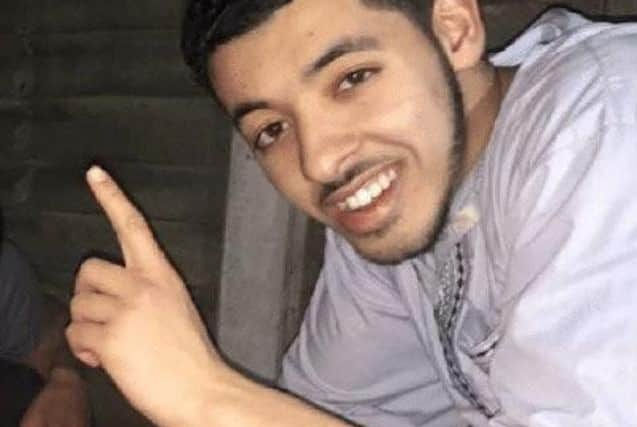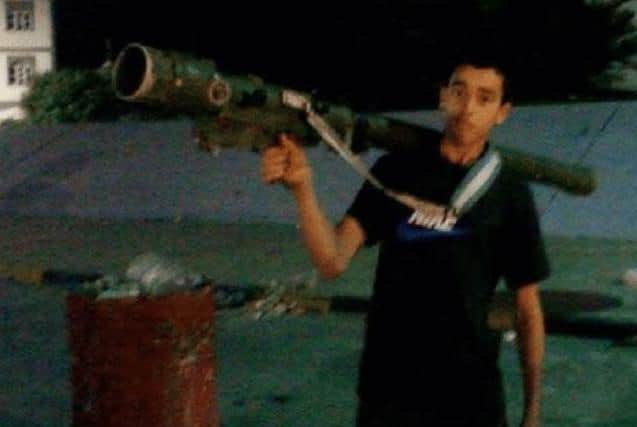Manchester Arena suicide bomber Salman Abedi was allowed to visit convicted terrorist in prison
and live on Freeview channel 276
Islamic extremist Abdalraouf Abdallah, 27, befriended Abedi, who visited him in jail in the months before he murdered 22 people and injured hundreds more in the terror attack.
Among Abedi's victims were eight-year-old Saffie Roussos, from Leyland, Georgina Callendar, 18, from Tartleton, mum-of-three Michelle Kiss from the Ribble Valley and Blackpool school receptionist Jane Tweddle.
Advertisement
Hide AdAdvertisement
Hide AdAbdallah is a man with “important evidence” about the background to the attack, the public inquiry currently sitting in Manchester has heard.


But Abdallah, from Manchester, who is a paraplegic after being injured fighting in Libya, is refusing to co-operate with lawyers for the inquiry.
He is claiming legal privilege by refusing to answer questions that may incriminate himself, the hearing was told.
Sources confirmed to the PA news agency that Abdallah is to be released this week.
Advertisement
Hide AdAdvertisement
Hide AdIn the months leading up to the Manchester Arena attack on May 2, 2017, both Salman and his brother Hashem became visibly more radicalised, gave up on education courses, wore traditional Islamic clothing and grew more religious in their attitudes, and Salman was seen associating with known extremist Abdallah.


How the brothers became radicalised is one of the key questions the inquiry is to explore.
Salman Abedi visited Abdallah in Belmarsh Prison on February 26 2015 while he was on remand for terror offences.
On May 11, 2016, Abdallah was sentenced for terror offences to an extended determinate sentence of nine-and-a-half years, made up of a custodial element of five-and-a-half years and an extended licence period of four years. He was designated as “dangerous” by the judge.
Advertisement
Hide AdAdvertisement
Hide AdAbedi visited Abdallah again at HMP Altcourse in Liverpool on January 18 2017 after Abdallah was convicted and serving his sentence, and the pair were in regular telephone contact.


The same month Abedi and his younger brother Hashem began preparing their bomb plot.
In February 2017, three months before the Arena bombing, prison authorities found that Abdallah had an illicit phone and had tried to make calls to Abedi.
The pair discussed martyrdom, the public inquiry has heard, and a third visit was booked for March 6, 2017, but did not take place.
Advertisement
Hide AdAdvertisement
Hide AdTwo months later, Abedi detonated his shrapnel-packed rucksack bomb, killing 22 people and injuring hundreds of others as they left an Ariana Grande concert.
Paul Greaney QC, counsel to the public inquiry, told the hearing earlier this year: “Salman Abedi’s relationship with Abdalraouf Abdallah was one of some significance in the period prior to the bombing and we are determined to get to the bottom of it.
“We have no doubt he is a witness with important evidence to give.
“We are continuing to pursue this line of inquiry. We hope on reflection he will co-operate, so will press for him to give evidence before the inquiry.”
Advertisement
Hide AdAdvertisement
Hide AdSalman Abedi's younger brother, Hashem Abedi, has been jailed for life with a minimum 55 years before parole for his part in the bomb plot.
Salman’s family in Libya is also refusing to co-operate with the inquiry, as is their older brother, Ismail Abedi, who lives in Manchester, who is refusing to answer questions.
Why was Abedi allowed to visit a convicted terrorist in prison?
Every prisoner in the UK is placed in one of four categories, from A to D, reflecting the level of security necessary to hold that inmate, with Category A being the highest.
Advertisement
Hide AdAdvertisement
Hide AdThe purpose of categorisation is to help manage the threat posed by each offender.
Abdallah was deemed a Category B prisoner, so not subject to the Approved Visitor Scheme, which operates for Category A inmates, who can only receive visitors from a pre-approved list, authorised by the prison's governor.
It is not clear why Abdallah was deemed a Category B prisoner as the trial judge who jailed him designated him a “dangerous” offender.
For prisoners in Categories B to D there is no routine vetting of visitors, other than for prisoners where there are child safeguarding or harassment concerns.
Advertisement
Hide AdAdvertisement
Hide AdAfter Abedi’s first visit to Abdallah in HMP Belmarsh in 2015, MI5 and the North West Counter Terrorism Unit actively sought information on the nature of his visit but this did not result in any intelligence which was assessed to justify opening Abedi as a Subject of Interest, the public inquiry into the Manchester terror attack heard.
Abedi made a second visit to Abdallah in January 2018, at HMP Altcourse in Liverpool, the same month he took the first steps in planning his Arena attack.
Cathryn McGahey QC, counsel for the Home Office at the Manchester Arena Inquiry, said there are approximately 80,000 prisoners in England and Wales and there is “finite capacity” for the police to vet proposed visitors.
And she said any infringement on a prisoner’s or visitor’s human rights, the right to respect for private and family life, must be "justified, necessary and proportionate".
Advertisement
Hide AdAdvertisement
Hide AdThe Prison Service has since undertaken a “comprehensive review” in the way visits are controlled, including an evaluation of the arrangements applied to terrorist and other high-risk and extremist offenders in prison.
It is more important than ever on you taking out a digital subscription to support our journalism.
For unlimited access to news and information online, you can subscribe here.